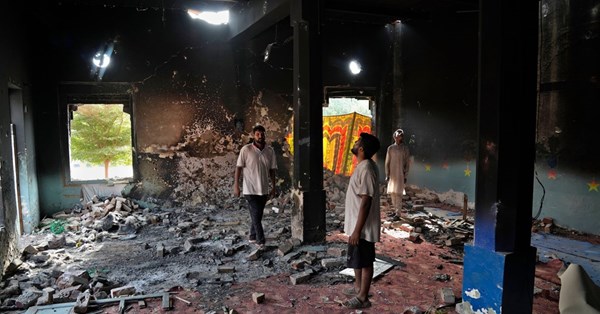CHRISTIAN communities in the Middle East “are in freefall”, the recently appointed UK Special Envoy for Freedom of Religion or Belief (FORB), David Smith MP (Labour), said last week in a Westminster Hall debate. “The point is clear: despite the global growth of the Church, Christians remain vulnerable to persecution and conflict.”
The debate had been called by Ruth Jones MP (Labour), who wanted to draw attention to the way in which “hundreds of millions of Christians — effectively entire populations — remain steadfast in their faith, at great personal cost.”
Ms Jones, a member of the All-Party Parliamentary Group for FORB, continued: “It is imperative that we advocate on their behalf, ensuring that they receive the fundamental freedoms that so many of us in democratic societies take for granted.
“Despite being the world’s largest religion, Christianity is the most persecuted minority faith in many regions. That persecution stems from a range of sources, including Islamist extremism, Marxist regimes, and dictatorial governments.”
Points were raised about Israel and Palestine (“People cannot worship in rubble”); about Afghanistan (“effectively impossible for a Christian to publicly express their faith”); and Pakistan (“young Christian men are increasingly being targeted for forced conversion”).
The increasing links with China were also questioned by MPs, when it was “a country where religious oppression has become ever more brazen”, Andrew Rosindell (Conservative) said. Research by Open Doors — “an organisation that monitors Christian persecution worldwide” — was cited on various countries.
Jim Shannon MP (DUP) wanted to “recognise the significance of 2025. Let it be a jubilee year not just in name, but in action — a year in which captives and the persecuted find justice, in which those in fear find protection, and in which nations find peace through the promotion of tolerance and interfaith dialogue.”
Danny Kruger MP (Conservative), who chairs the All-Party Parliamentary Group on Christianity in the Holy Land, spoke of “what we think of as the intrinsic value of every human being comes only from one place: the Bible. . . we are the heirs to a tradition that fundamentally recognises the value of Christianity.”
He was also optimistic. “There are great things happening in the world. Christianity is not oppressed, downtrodden, or downcast. We are seeing very positive signs of growth and revival.”
Tim Farron (Liberal Democrat) referred to “Christian nationalism around the world, where Christianity is appropriated for political purposes”. Sir John Hayes (Conservative) was concerned about “parliamentary questions; I asked one when 70 Christians were found beheaded in the Congo. The response I got was full of broadly drawn liberal platitudes about universality and multilateralism.”
“The statistics bear repeating: 380 million Christians face high levels of persecution and discrimination, which is one in seven believers,” the Foreign Office minister Stephen Doughty said. “Nearly 4500 were murdered for their faith last year, and over 200,000 were forced into hiding or exile, each with their own terrible story to tell.”
Responding to questions about the budget for overseas development aid (ODA), he said that the cuts were something that the Government had not been “happy to make”, although he did not reply to the suggestion that the ODA be withheld from countries that persecuted Christians. He referred to a string of policy interventions and policy initiatives around the world aimed at the promotion of FORB.
In concluding, Ms Jones said: “We need to make sure that we are turning laudable words into concrete actions to protect and support our Christian brothers and sisters across the world.”
















